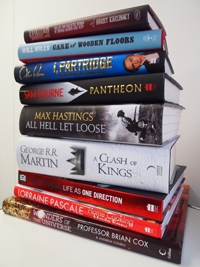Byte-sized stories

He’s only weeks into his new role as senior vice-president of insight at HarperCollins, the book publishing arm of Rupert Murdoch’s News Corp empire, but already David Boyle is thinking big. He’s hard at work building an online dashboard where people from around the business can go to explore data about the distinct types of readers that make up HarperCollins’ customer base.
“It’s about the books market widely but it’s also about implications for individual authors,” Boyle says. “We’ve picked 15 authors – a mix of household names and new and upcoming talent – and we’re tackling lots of issues at the same time. We’re thinking about the big issues around products and pricing.”
Pricing in particular has been something of a headache for HarperCollins in the recent past. It was one of five publishers accused last year of colluding with Apple in an ebook price-fixing conspiracy designed to limit Amazon’s market dominance. The charges were settled before going to court, and Amazon – along with its Kindle e-reader – remains a major threat to traditional book businesses, many of which are bulking up in a wave of consolidation.

Digital revolution
The price-fixing débâcle was before Boyle’s time and, perhaps unsurprisingly, he won’t be drawn on it. What he is interested in is developing an understanding of how ebooks are changing reading behaviours and book-buying habits, and how publishers can work out who’s going digital and who’s not.
“It’s about understanding the market issues to help us be smarter and more structured in our approach,” he says. “What we’re developing is a lens that we’ll use to look at the authors in relation to which segments are most relevant to them. It’s about being a little clearer about consumers, products, channels, prices and marketing. It’s not about radical, bold headlines. It’s about making projects smarter.”
Having spent four years at record label EMI it would be easy, perhaps, for Boyle to draw parallels with the music industry. But there are plenty of differences between the two sectors – not least the fact that few readers have switched entirely to ebooks. “A good chunk of people are digital-only in the music world, whereas physical books do still have a role. This is quite a profound difference,” he says.
“I guess each media industry has a different balance. In music, digital is something of a dirty word. But in the book world it’s exciting. There are similar issues in terms of how people engage with the products, but there are different implications too.
“Every consumer segment we’ve identified at HarperCollins values books, even if they’re incredibly digital,” he argues. “Vinyl was a special object whereas CDs are not that exciting. Plastic gets tatty. Many consumers are ditching CDs, whereas books are beautiful things that have value. They play a different role. A book is something very different to a CD. You can’t compare the two directly.”
The publishing industry is also seeing something of a slowdown in the adoption of ebooks, Boyle notes: “The numbers are flat. In terms of finding out the why behind this, I guess there’s more work to do.” Meanwhile, Rupert Murdoch – a steadfast believer in the importance of print journalism – isn’t about to give up on books either it seems, given News Corp’s recent (failed) bid for Penguin and talk of a possible merger between HarperCollins and Simon & Schuster.
New beginnings
Boyle has been in his role at HarperCollins for less than a month at the time of our interview. It’s early doors, then, but he reckons anything is possible with a clear vision of what you want to achieve. “We’re in step one right now. I’m trying to tease out insight and work out how research can help,” he says, circling back to talk about the online dashboard he’s building. “We’ll allow people to integrate the dashboard in their own way. They don’t need to call me to use it. It’s about spending time with people, making sure it works, making the tools exciting and letting people do it themselves.”
The dashboard has been designed for ease of use. It features a drop-down menu of authors and genres, which can be split out into thousands of alternatives, but which helps to distil down key pieces of insight. “The idea is that if you pick an author or a genre it helps you to understand the consumer segments and their relationship,” Boyle says. “It’s author-specific and genre-specific. you can look through different lenses at consumers and explore their relationship with the author and the genre.”
It’s built on a cloud-based visualisation technology from Microsoft and has been amended numerous times over the past weeks following conversations with individuals around the business. Boyle is clearly not too precious about the way things are done, as long as his colleagues choose to use the insight he’s offering.
“You have to have conversations with people to make sure that it works for them,” he says. “The dashboard today looks nothing like it did three weeks ago. We had a rough sketch on day one – but it’s not about imposing something on people. It’s about context, and letting the tools fit into their daily life. that’s the aim. the alternative is having to call the research guy to book a meeting.”
At EMI, Boyle strived to create a culture of insight. “Our differentiation was in understanding and respecting data, not the data itself. It was in our bones, our language, our culture. It felt sensible and natural.” Yet he didn’t set out to achieve this by dictating from above. rather it came about through a process of diplomatic, grassroots engagement.
This is the process that’s now underway at HarperCollins. He’s starting small – his department is effectively a one-man band – but Boyle’s clearly building towards something bigger. “I’m having fun,” he says. “I’m sure the team will grow but it’s step by step.”

Read the full article
in the digital version of Impact, the new quarterly magazine from the
Market Research Society.
Includes more of David Boyle’s thoughts on:
- Social media research
- The value of surveys
- Why people get over-awed by big data
- Delivering impact
- Rules to live by

We hope you enjoyed this article.
Research Live is published by MRS.
The Market Research Society (MRS) exists to promote and protect the research sector, showcasing how research delivers impact for businesses and government.
Members of MRS enjoy many benefits including tailoured policy guidance, discounts on training and conferences, and access to member-only content.
For example, there's an archive of winning case studies from over a decade of MRS Awards.
Find out more about the benefits of joining MRS here.











0 Comments